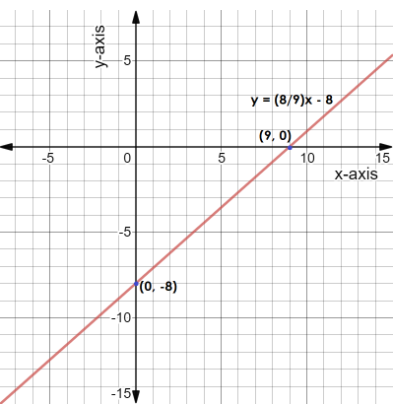Question
Question: How do you find the \(x\) and \(y\) intercepts for \(y = \dfrac{8}{9}x - 8\)?...
How do you find the x and y intercepts for y=98x−8?
Solution
The x intercepts for a curve on the graph are the points at which the curve intersects the x-axis. At these points y=0. Similarly, y intercepts for a curve on the graph are the points at which the curve intersects the y-axis. At these points x=0
Complete step-by-step solution:
We have to find x and y intercepts for the equation y=98x−8.
First we find the x intercept.
The x intercepts are the points at which the curve intersects the x-axis. To find the abscissa, i.e. x coordinate, we assume y=0 and evaluate the corresponding value of x.
y=98x−8 ⇒0=98x−8 ⇒98x=8 ⇒x=8×89=9
Thus, we get the point as (9,0). This is the x intercept of the graph of the given equation.
Now we find the y intercept.
The y intercepts are the points at which the curve intersects the y-axis. To find the ordinate, i.e. y coordinate, we assume x=0 and evaluate the corresponding value of y.
y=98x−8 ⇒y=98×0−8 ⇒y=0−8 ⇒y=−8
Thus, we get the point as (0,−8). This is the y intercept of the graph of the given equation.
Hence, for the graph of the given equation we get the x intercept as (9,0) and the y intercept as (0,−8).
This we can also show from the graph of the equation y=98x−8.

We can see in the above graph that the line of the equation cuts the x-axis at (9,0) and the y-axis at (0,−8).
Note: To find the x intercept we put y=0 and to find y intercept we put x=0 in the given equation. For a linear equation, we can also find the intercepts by writing the equation in the form of ax+by=1, where a will be the x intercept and b will be the y intercept. For a linear equation in two variables we get at most one x intercept and at most one y intercept.
